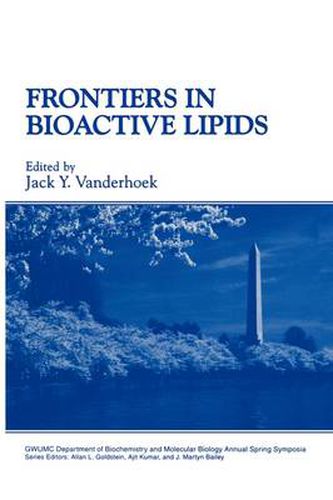Readings Newsletter
Become a Readings Member to make your shopping experience even easier.
Sign in or sign up for free!
You’re not far away from qualifying for FREE standard shipping within Australia
You’ve qualified for FREE standard shipping within Australia
The cart is loading…






This title is printed to order. This book may have been self-published. If so, we cannot guarantee the quality of the content. In the main most books will have gone through the editing process however some may not. We therefore suggest that you be aware of this before ordering this book. If in doubt check either the author or publisher’s details as we are unable to accept any returns unless they are faulty. Please contact us if you have any questions.
Recent advances in our understanding of the fundamental role of bioactive lipids in normal and abnormal physiology was the theme of the XVlth International Spring Sympo- 6-9, 1996 at the George Washington University School sium on Health Sciences held on May of Medicine in Washington, D.C. Over 250 participants shared their latest findings on fundamental mechanisms in lipid metabolism, transport, and signal transduction. Most of the papers presented at the plenary sessions have been collected in this volume, which is divided into seven parts. The focus of Part I is on the new roles that fatty acids and esters play in cellular function. These activities include regulation of gene expression, control of eicosanoid-me- diated responses, and intracellular calcium sequestration. Most biological effects of fatty acids, esters, and phospholipids are transmitted via the interaction of these lipid molecules with specific lipid binding proteins. The chapters in Part II detail the involvement of these in the transport of fatty acids, fatty acyl CoA esters, and phospholipids, and in the proteins modulation of the fatty acid-induced activation of the peroxisome proliferator-activated receptors. The study of arachidonic acid metabolism continues to be the subject of intense interest and research. A number of studies in Part III deal with the substantial differences between the constitutive prostaglandin H synthase isozyme (PGHS-l or COX-I) and the inducible form PGHS-2 (COX-2) regarding compartmentation, control, and expression.
$9.00 standard shipping within Australia
FREE standard shipping within Australia for orders over $100.00
Express & International shipping calculated at checkout
This title is printed to order. This book may have been self-published. If so, we cannot guarantee the quality of the content. In the main most books will have gone through the editing process however some may not. We therefore suggest that you be aware of this before ordering this book. If in doubt check either the author or publisher’s details as we are unable to accept any returns unless they are faulty. Please contact us if you have any questions.
Recent advances in our understanding of the fundamental role of bioactive lipids in normal and abnormal physiology was the theme of the XVlth International Spring Sympo- 6-9, 1996 at the George Washington University School sium on Health Sciences held on May of Medicine in Washington, D.C. Over 250 participants shared their latest findings on fundamental mechanisms in lipid metabolism, transport, and signal transduction. Most of the papers presented at the plenary sessions have been collected in this volume, which is divided into seven parts. The focus of Part I is on the new roles that fatty acids and esters play in cellular function. These activities include regulation of gene expression, control of eicosanoid-me- diated responses, and intracellular calcium sequestration. Most biological effects of fatty acids, esters, and phospholipids are transmitted via the interaction of these lipid molecules with specific lipid binding proteins. The chapters in Part II detail the involvement of these in the transport of fatty acids, fatty acyl CoA esters, and phospholipids, and in the proteins modulation of the fatty acid-induced activation of the peroxisome proliferator-activated receptors. The study of arachidonic acid metabolism continues to be the subject of intense interest and research. A number of studies in Part III deal with the substantial differences between the constitutive prostaglandin H synthase isozyme (PGHS-l or COX-I) and the inducible form PGHS-2 (COX-2) regarding compartmentation, control, and expression.